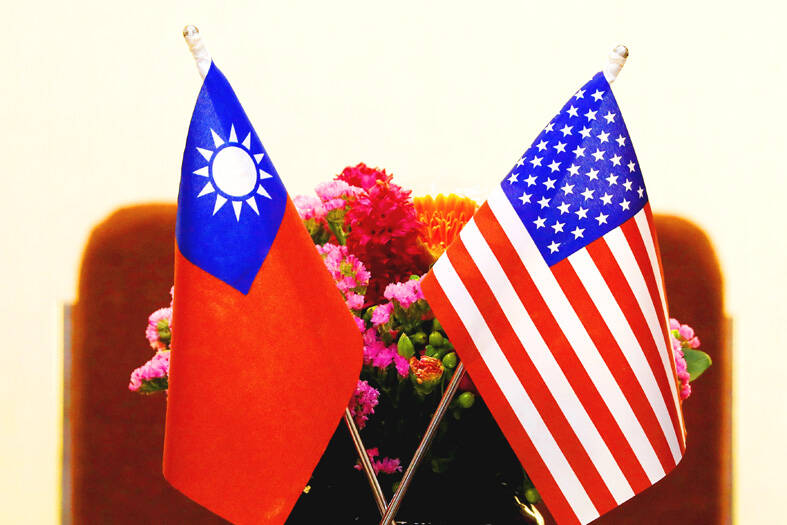The US House of Representatives on Thursday passed the 2023 National Defense Authorization Act (NDAA), which authorizes up to US$12 billion in grants and loans to Taiwan to buy US weapons over the next five years.
The bill passed the Democratic Party-controlled House on a 350 to 80 vote. It is expected to clear the Senate next week before being sent to the White House for US President Joe Biden to sign into law.
The act would authorize up to US$2 billion in annual grants from next year to 2027, and an additional US$2 billion in loans for Taiwan to use to bolster its military capabilities with weapons from the US.

Photo: Tyrone Siu, Reuters
It also authorizes a regional contingency stockpile for Taiwan that consists of munitions and other appropriate defense articles costing up to US$100 million a year for use in the event of a conflict.
The bill gives Taiwan the same treatment as major non-NATO allies — most of which are in South America and the western Pacific — in priority to obtain “excess defense articles” from the US.
The act also recommends that the US administration invite Taiwan to attend the US-organized Rim of the Pacific Exercise, a regional military drill, in 2024.
The bill states that the US secretary of state and secretary of defense must prioritize and expedite requests from Taiwan under the Foreign Military Sales program without delaying the processing for bundling purposes.
The bill was proposed following China’s increased military actions in and near the Taiwan Strait in recent years, and amid growing concerns in Taipei and Washington that China’s military buildup has far exceeded that of Taiwan.
However, the percentage of Taiwan’s GDP spent on weapons purchases has not grown measurably since the election of the current Taiwanese administration, despite increased threats from China.
While purchasing US-made weapons each year, Taipei is also increasing its manufacture of locally made weaponry.

CHAOS: Iranians took to the streets playing celebratory music after reports of Khamenei’s death on Saturday, while mourners also gathered in Tehran yesterday Iranian Supreme Leader Ayatollah Ali Khamenei was killed in a major attack on Iran launched by Israel and the US, throwing the future of the Islamic republic into doubt and raising the risk of regional instability. Iranian state television and the state-run IRNA news agency announced the 86-year-old’s death early yesterday. US President Donald Trump said it gave Iranians their “greatest chance” to “take back” their country. The announcements came after a joint US and Israeli aerial bombardment that targeted Iranian military and governmental sites. Trump said the “heavy and pinpoint bombing” would continue through the week or as long

TRUST: The KMT said it respected the US’ timing and considerations, and hoped it would continue to honor its commitments to helping Taiwan bolster its defenses and deterrence US President Donald Trump is delaying a multibillion-dollar arms sale to Taiwan to ensure his visit to Beijing is successful, a New York Times report said. The weapons sales package has stalled in the US Department of State, the report said, citing US officials it did not identify. The White House has told agencies not to push forward ahead of Trump’s meeting with Chinese President Xi Jinping (習近平), it said. The two last month held a phone call to discuss trade and geopolitical flashpoints ahead of the summit. Xi raised the Taiwan issue and urged the US to handle arms sales to

BIG SPENDERS: Foreign investors bought the most Taiwan equities since 2005, signaling confidence that an AI boom would continue to benefit chipmakers Taiwan Semiconductor Manufacturing Co’s (TSMC, 台積電) market capitalization swelled to US$2 trillion for the first time following a 4.25 percent rally in its American depositary receipts (ADR) overnight, putting the world’s biggest contract chipmaker sixth on the list of the world’s biggest companies by market capitalization, just behind Amazon.com Inc. The site CompaniesMarketcap.com ranked TSMC ahead of Saudi Aramco and Meta Platforms Inc. The Taiwanese company’s ADRs on Tuesday surged to US$385.75 on the New York Stock Exchange, as strong demand for artificial intelligence (AI) applications led to chip supply constraints and boost revenue growth to record-breaking levels. Each TSMC ADR represents

State-run CPC Corp, Taiwan (CPC, 台灣中油) yesterday said that it had confirmed on Saturday night with its liquefied natural gas (LNG) and crude oil suppliers that shipments are proceeding as scheduled and that domestic supplies remain unaffected. The CPC yesterday announced the gasoline and diesel prices will rise by NT$0.2 and NT$0.4 per liter, respectively, starting Monday, citing Middle East tensions and blizzards in the eastern United States. CPC also iterated it has been reducing the proportion of crude oil imports from the Middle East and diversifying its supply sources in the past few years in response to geopolitical risks, expanding